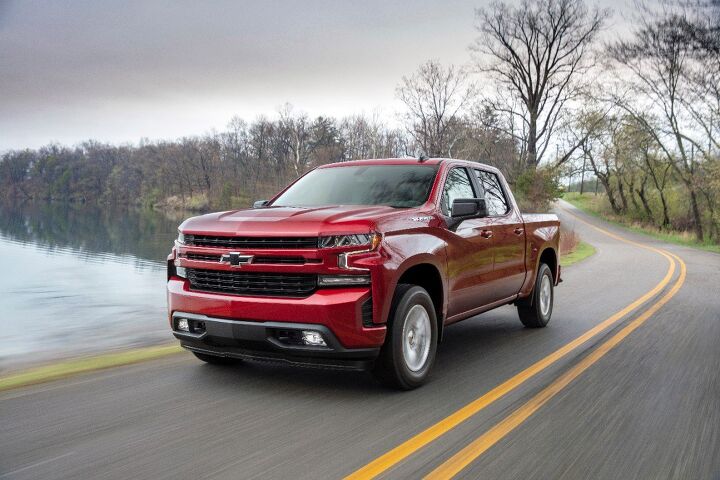General Motors More Interested in Flying Taxis Than Electric Pickups

General Motors’ vice president of global strategy, Mike Abelson, recently confessed to the Detroit Free Press that the automaker has spoken with “air taxi” companies about using the carmaker’s autonomous and electric vehicle technology to produce flying cars.
“There will be some sort of air transport that will get integrated with this AV/EV technology,” Abelson said during Financial Times’ Future of the Car Summit in Detroit.
Not being ones for the fantastical, we were immediately dismissive of any air taxi service occurring any time soon. However, the real takeaway from the interview wasn’t that GM wanted to build flying cars — it was that the brand doesn’t seem to have much faith in widespread EV adoption. From the sound of things, General Motors thinks flying cars have more market potential than an electric pickup truck.
Abelson said flying cars becoming commonplace was probably still “some years away,” but noted Detroit industrial engineer Sanjay Dhall has already built a prototype. When asked about the potential inclusion of an battery electric pickup, he was pretty clear on the matter. “The core business is going to be the core business for a couple of decades to come,” he explained. “There will not be any AV/EV pickups.”
Twenty years away might as well be an eternity for an automaker. It’s too hard to guess where you’ll be by then, so it’s surprising Abelson even has an opinion on electrified pickups being built before 2040. Considering GM intends to roll out 20 new all-electric vehicles over the next five years, it might have well suggest that an e-pickup could be part of the next batch.
“EV adoption isn’t optional, it’s mandatory,” Abelson said. “The rest of the world is moving aggressively toward EVs.” The global strategy head noted that GM has asked the federal government for one national gas mileage standard after supporting the fuel economy rollback, and supports measures that would require a percentage of auto companies’ sales be zero-emissions vehicles. With that being the case, why is there no room for an electric truck in the corporate stable?
General Motors hopes to surpass Tesla, which is expected to build an electrified pickup someday, as the world’s leading EV manufacturer within the next decade. But GM seems more interested in offering high-tech vehicles as a service, rather than utilize them for consumer sale. Perhaps an electric pickup truck doesn’t have a place within a services-based business. However, if the automaker intends to keep leaning on its “core business” of truck sales, it seems curious that it would be so dismissive of alternative powertrains. We’ll admit that demand for such a vehicle would likely be rather low if it were manufactured today.
It’s a small detail to harp on, but it creates a lot of question as to what General Motors’ long-term goals are. A zero-emissions pickup for the consumer market is basically out of the question but it’ll happily deploy flying, autonomous taxis the second it can work out the bugs? Is the plan to just continue selling the most profitable models unchanged while it works on how to turn a buck as a services-based mobility company?
Maybe it’s just that automakers can’t admit that flying cars are ridiculous. There are a bunch of companies that have at least a small fraction of their money roped into developing the technology, usually in cooperation with some startup. All of their proposals seem comically fantastical and would require years of overcoming regulatory hurdles as the government attempted to decide how to manage the mainstreaming of automotive flight. Yet every presentation we’ve seen treats the matter as if it were completely reasonable to expect the technology within a few years.
[Image: General Motors]

A staunch consumer advocate tracking industry trends and regulation. Before joining TTAC, Matt spent a decade working for marketing and research firms based in NYC. Clients included several of the world’s largest automakers, global tire brands, and aftermarket part suppliers. Dissatisfied with the corporate world and resentful of having to wear suits everyday, he pivoted to writing about cars. Since then, that man has become an ardent supporter of the right-to-repair movement, been interviewed on the auto industry by national radio broadcasts, driven more rental cars than anyone ever should, participated in amateur rallying events, and received the requisite minimum training as sanctioned by the SCCA. Handy with a wrench, Matt grew up surrounded by Detroit auto workers and managed to get a pizza delivery job before he was legally eligible. He later found himself driving box trucks through Manhattan, guaranteeing future sympathy for actual truckers. He continues to conduct research pertaining to the automotive sector as an independent contractor and has since moved back to his native Michigan, closer to where the cars are born. A contrarian, Matt claims to prefer understeer — stating that front and all-wheel drive vehicles cater best to his driving style.
More by Matt Posky
Latest Car Reviews
Read moreLatest Product Reviews
Read moreRecent Comments
- MaintenanceCosts Whenever the topic of the xB comes up…Me: "The style is fun. The combination of the box shape and the aggressive detailing is very JDM."Wife: "Those are ghetto."Me: "They're smaller than a Corolla outside and have the space of a RAV4 inside."Wife: "Those are ghetto."Me: "They're kind of fun to drive with a stick."Wife: "Those are ghetto."It's one of a few cars (including its fellow box, the Ford Flex) on which we will just never see eye to eye.
- Oberkanone The alternative is a more expensive SUV. Yes, it will be missed.
- Ajla I did like this one.
- Zerofoo No, I won't miss this Chevrolet Malibu. It's a completely forgettable car. Who in their right mind would choose this over a V8 powered charger at the rental counter? Even the V6 charger is a far better drive.
- Offbeat Oddity Nope, I won't miss it. I loved the 2008-2012 Malibu, but the subsequent generations couldn't hold a candle to it. I think the Impala was much more compelling at the end.


































Comments
Join the conversation
Need an electric drive truck, not a BEV truck. Stop turning the wheels with the ICE. 2L motor generator running HCCI at rev limited 1600 - 2000. 400hp/400lbs electric motor turning the wheels. Put in just enough battery for buffer.
Ford: We have no idea what we're doing and have dumb ideas. GM: Hold my drink.